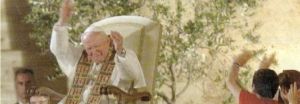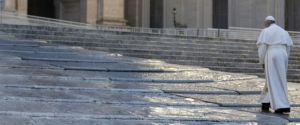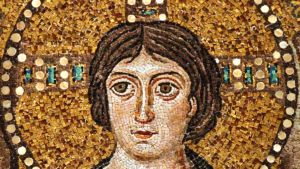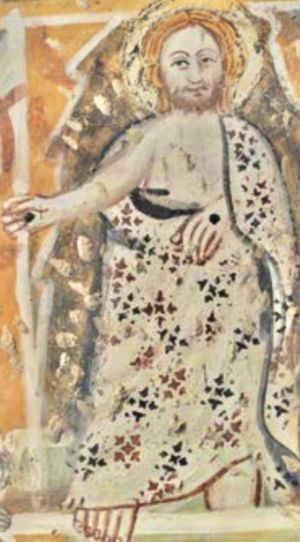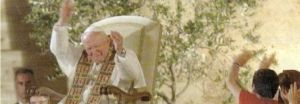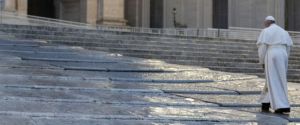
don Giuseppe Nespeca
Giuseppe Nespeca è architetto e sacerdote. Cultore della Sacra scrittura è autore della raccolta "Due Fuochi due Vie - Religione e Fede, Vangeli e Tao"; coautore del libro "Dialogo e Solstizio".
Difference that restores
1. In the Gospels we find another fact that attests to Jesus' consciousness of possessing divine authority, and the persuasion that the evangelists and the early Christian community had of this authority. In fact, the Synoptics agree in saying that Jesus' listeners "were amazed at his teaching, because he taught them as one having authority, and not as the scribes" (Mk 1:22; Mt 7:29; Lk 4:32). This is valuable information that Mark gives us from the very beginning of his Gospel. It attests to the fact that the people had immediately grasped the difference between Christ's teaching and that of the Israelite scribes, and not only in the manner, but in the very substance: the scribes based their teaching on the text of the Mosaic Law, of which they were the interpreters and commentators; Jesus did not at all follow the method of a "teacher" or a "commentator" of the ancient Law, but behaved like a legislator and, ultimately, like one who had authority over the Law. Note: the listeners were well aware that this was the divine Law, given by Moses by virtue of power that God himself had granted him as his representative and mediator with the people of Israel.
The evangelists and the early Christian community who reflected on that observation of the listeners about Jesus' teaching, realised even better its full significance, because they could compare it with the whole of Christ's subsequent ministry. For the Synoptics and their readers, it was therefore logical to move from the affirmation of a power over the Mosaic Law and the entire Old Testament to that of the presence of a divine authority in Christ. And not only as in an Envoy or Legate of God as it had been in the case of Moses: Christ, by attributing to himself the power to authoritatively complete and interpret or even give in a new way the Law of God, showed his consciousness of being "equal to God" (cf. Phil 2:6).
2. That Christ's power over the Law involves divine authority is shown by the fact that he does not create another Law by abolishing the old one: "Do not think that I have come to abolish the law or the prophets; I have not come to abolish but to fulfil" (Mt 5:17). It is clear that God could not "abolish" the Law that he himself gave. He can instead - as Jesus Christ does - clarify its full meaning, make its proper sense understood, correct the false interpretations and arbitrary applications, to which the people and their own teachers and leaders, yielding to the weaknesses and limitations of the human condition, have bent it.
This is why Jesus announces, proclaims and demands a "righteousness" superior to that of the scribes and Pharisees (cf. Mt 5:20), the "righteousness" that God Himself has proposed and demands with the faithful observance of the Law in order to the "kingdom of heaven". The Son of Man thus acts as a God who re-establishes what God has willed and placed once and for all.
3. For of the Law of God he first of all proclaims: "Verily I say unto you, Till heaven and earth pass away, not one iota or one sign of the law shall pass away, and all things shall be fulfilled" (Matt 5:18). It is a drastic statement, with which Jesus wants to affirm both the substantial immutability of the Mosaic Law and the messianic fulfilment it receives in his word. It is about a "fullness" of the Old Law, which he, teaching "as one who has authority" over the Law, shows to be manifested above all in love of God and neighbour. "On these two commandments depend all the Law and the Prophets" (Mt 22:40). It is a "fulfilment" corresponding to the "spirit" of the Law, which already transpires from the "letter" of the Old Testament, which Jesus grasps, synthesises, and proposes with the authority of one who is Lord also of the Law. The precepts of love, and also of the faith that generates hope in the messianic work, which he adds to the ancient Law, making its content explicit and developing its hidden virtues, are also a fulfilment.
His life is a model of this fulfilment, so that Jesus can say to his disciples not only and not so much: Follow my Law, but: Follow me, imitate me, walk in the light that comes from me.
4. The Sermon on the Mount, as recorded by Matthew, is the place in the New Testament where one sees Jesus clearly affirmed and decisively exercised the power over the Law that Israel received from God as the cornerstone of the covenant. It is there that, after having declared the perennial value of the Law and the duty to observe it (Mt 5:18-19), Jesus goes on to affirm the need for a "justice" superior to "that of the scribes and Pharisees", that is, an observance of the Law animated by the new evangelical spirit of charity and sincerity.
The concrete examples are well known. The first consists in the victory over wrath, resentment, and malice that easily lurk in the human heart, even when an outward observance of the Mosaic precepts can be exhibited, including the precept not to kill: "You have heard that it was said to the ancients: 'You shall not kill; whoever kills shall be brought into judgment. But I say to you, whoever is angry with his brother shall be brought into judgment" (Mt 5:21-22). The same thing applies to anyone who offends another with insulting words, with jokes and mockery. It is the condemnation of every yielding to the instinct of aversion, which potentially is already an act of injury and even of killing, at least spiritually, because it violates the economy of love in human relationships and hurts others, and to this condemnation Jesus intends to counterpose the Law of charity that purifies and reorders man down to the innermost feelings and movements of his spirit. Jesus makes fidelity to this Law an indispensable condition of religious practice itself: "If therefore you present your offering at the altar and there you remember that your brother has something against you, leave your gift there before the altar, and go first to be reconciled with your brother and then return to offer your gift" (Mt 5:23-24). Since it is a law of love, it is even irrelevant who it is that has something against the other in his heart: the love preached by Jesus equals and unifies everyone in wanting what is good, in establishing or restoring harmony in relations with one's neighbour, even in cases of disputes and legal proceedings (cf. Mt 5:25).
5. Another example of perfecting the Law is that concerning the sixth commandment of the Decalogue, in which Moses forbade adultery. In hyperbolic and even paradoxical language, designed to draw the attention and shake the mood of his listeners, Jesus announces. "You have heard that it was said, Do not commit adultery, but I say to you . . ." (Mt 5:27); and he also condemns impure looks and desires, while recommending the flight from opportunities, the courage of mortification, the subordination of all acts and behaviour to the demands of the salvation of the soul and of the whole man (cf. Mt 5:29-30).
This case is related in a certain way to another one that Jesus immediately addresses: "It was also said: Whoever repudiates his wife, let him give her the act of repudiation; but I say to you . . ." and declares forfeited the concession made by the old Law to the people of Israel "because of the hardness of their hearts" (cf. Mt 19:8), prohibiting also this form of violation of the law of love in harmony with the re-establishment of the indissolubility of marriage (cf. Mt 19:9).
6. With the same procedure, Jesus contrasts the ancient prohibition of perjury with that of not swearing at all (Mt 5, 33-38), and the reason that emerges quite clearly is still founded in love: one must not be incredulous or distrustful of one's neighbour, when he is habitually frank and loyal, and rather one must on the one hand and on the other follow this fundamental law of speech and action: "Let your language be yes, if it is yes; no, if it is no. The more is from the evil one" (Mt 5:37).
7. And again: "You have heard that it was said, 'An eye for an eye and a tooth for a tooth; but I say to you, do not oppose the evil one...'" (Mt 5:38-39), and in metaphorical language Jesus teaches to turn the other cheek, to surrender not only one's tunic but also one's cloak, not to respond violently to the anguish of others, and above all: "Give to those who ask you and to those who seek a loan from you do not turn your back" (Mt 5:42). Radical exclusion of the law of retribution in the personal life of the disciple of Jesus, whatever the duty of society to defend its members from wrongdoers and to punish those guilty of violating the rights of citizens and the state itself.
8. And here is the definitive refinement, in which all the others find their dynamic centre: "You have heard that it was said, 'You shall love your neighbour and hate your enemy; but I say to you, love your enemies and pray for your persecutors, that you may be children of your heavenly Father, who makes his sun rise on the wicked and on the good, and makes it rain on the just and on the unjust . . ." (Mt 5:43-45). To the vulgar interpretation of the ancient Law that identified the neighbour with the Israelite and indeed with the pious Israelite, Jesus opposes the authentic interpretation of God's commandment and adds to it the religious dimension of the reference to the clement and merciful heavenly Father, who benefits all and is therefore the supreme exemplar of universal love.
Indeed, Jesus concludes: "Be... perfect as your heavenly Father is perfect" (Mt 5:48). He demands of his followers the perfection of love. The new law he brings has its synthesis in love. This love will make man overcome the classic friend-enemy opposition in his relations with others, and will tend from within hearts to translate into corresponding forms of social and political solidarity, even institutionalised. The irradiation of the 'new commandment' of Jesus will therefore be very broad in history.
9. At this point, we would particularly like to note that in the important passages of the "Sermon on the Mount", the contrast is repeated: "You have heard that it was said . . . But I say to you"; and this is not to "abolish" the divine Law of the old covenant, but to indicate its "perfect fulfilment", according to the meaning intended by God the Lawgiver, which Jesus illuminates with a new light and explains in all its fulfilling value of new life and generator of new history: and he does so by attributing to himself an authority that is that of God the Lawgiver. It can be said that in that expression repeated six times: I say to you, there resounds the echo of that self-definition of God, which Jesus also attributed to himself: "I am" (cf. Jn 8:58).
10. Finally, one must recall the answer that Jesus gave to the Pharisees, who reproached his disciples for plucking the ears of grain from the fields full of wheat in order to eat them on the Sabbath, thus violating the Mosaic law. Jesus first cites to them the example of David and his companions who did not hesitate to eat the "offering loaves" to feed themselves, and that of the priests who on the Sabbath day did not observe the law of rest because they performed their duties in the temple. Then he concludes with two peremptory statements, unheard of for the Pharisees: "Now I say to you that there is something greater here than the temple . . .", and: "The Son of Man is Lord even of the Sabbath" (Mt 12:6.8; cf. Mk 2:27-28). These are statements that clearly reveal the consciousness Jesus had of his divine authority. Calling himself "one above the temple" was a quite clear allusion to his divine transcendence. Then proclaiming himself "lord of the Sabbath", i.e. of a Law given by God himself to Israel, was an open proclamation of his authority as the head of the messianic kingdom and promulgator of the new Law. It was therefore not a matter of mere derogations from the Mosaic Law, admitted even by the rabbis in very restricted cases, but of a reintegration, a completion and a renewal that Jesus enunciates as eternal: "Heaven and earth shall pass away, but my words shall not pass away" (Mt 24:35). What comes from God is eternal, as God is eternal.
[Pope John Paul II, General Audience 14 October 1987]
Jesus' attitude towards the Jewish Law: deep motivations, hidden wisdom. Precept - need for love
This […] Gospel continues the “Sermon on the Mount”: Jesus’ first great preaching. Today’s theme is Jesus’ attitude toward the Jewish Law. He says: “Think not that I have come to abolish the Law and the Prophets; I have come not to abolish them but to fulfil them” (Mt 5:17). Jesus did not want to do away with the Commandments that the Lord had given through Moses; rather, he wanted to bring them to fulfilment. He then added that this “fulfilment” of the Law requires a higher kind justice, a more authentic observance. In fact, he says to his disciples: “Unless your righteousness exceeds that of the scribes and Pharisees, you will never enter the kingdom of heaven” (Mt 5:20).
But what does this “fulfilment” of the Law mean? What is this superior justice? Jesus himself answers this question with a few examples. Jesus was practical and he always used examples to make himself understood, comparing the old Law with his teachings. He begins with the fifth of the Ten Commandments: “You have heard that it was said to the men of old, ‘You shalt not kill’ ... But I say to you that everyone who is angry with his brother shall be liable to council” (v. 21-22). In this way, Jesus reminds us that words can kill! When we say that a person has the tongue of a snake, what does that mean? That their words kill! Not only is it wrong to take the life of another, but it is also wrong to bestow the poison of anger upon him, strike him with slander, and speak ill of him.
This brings us to gossip: gossip can also kill, because it kills the reputation of the person! It is so terrible to gossip! At first it may seem like a nice thing, even amusing, like enjoying a candy. But in the end, it fills the heart with bitterness, and even poisons us. What I am telling you is true, I am convinced that if each one of us decided to avoid gossiping, we would eventually become holy! What a beautiful path that is! Do we want to become holy? Yes or no? [The people: Yes!] Do we want to be attached to the habit of gossip? Yes or no? [The people: No!] So we agree then: no gossiping! Jesus offers the perfection of love to those who follow him: love is the only measure that has no measure, to move past judgements.
Love of neighbour is a fundamental attitude that Jesus speaks of, and he says that our relationship with God cannot be honest if we are not willing to make peace with our neighbour. He says: “So if you are offering your gift at the altar, and there remember that your brother has something against you, leave your gift there before the altar and go; first be reconciled to your brother, and then come and offer your gift” (v. 23-24). Therefore we are called to reconcile with our neighbour before showing our devotion to the Lord in prayer.
In all of this we see that Jesus does not give importance simply to disciplinary compliance and exterior conduct. He goes to the Law’s roots focusing, first and foremost, on the intention and the human heart, from which our good and bad actions originate. To obtain good and honest conduct, legal rules are not enough. We need a deep motivation, an expression of a hidden wisdom, God’s wisdom, which can be received through the Holy Spirit. Through faith in Christ, we can open ourselves to the action of the Spirit which enable us to experience divine love.
In the light of Christ’s teaching, every precept reveals its full meaning as a requirement of love, and they all come together in the greatest commandment: to love God with all of your heart and to love your neighbour as yourself.
[Pope Francis, Angelus 16 February 2014]
Against the tide Transfiguration. Faith and metamorphosis
Continuous Prayer
Incessant struggle with ourselves and God
(Mt 7:7-12)
Sometimes we put the Father in the dock, because he seems to let things go as our freedom directs them.
But his Design isn’t to make the world work perfectly with transistors (of the past) or integrated circuits (in their respective "packages") or "chips" [various "pieces"]…
God wants us to acquire a New Creation mentality. His Action shapes us on the Son, transforming projects, ideas, desires, words, standard behaviors.
At first, perhaps prayer may seem tinged with only requests. The more one proceeds in the experience of prayer in Christ, the less one asks.
Questions are attenuated, to the point of almost entirely ceasing - in an ever more conscious welcome, which becomes real contemplation and ‘union’.
We do not know how long, but the "result" takes over suddenly: not only certain, but disproportionate.
As extracted from a continuous incandescence process, where there are no logical networks, nor easy shortcuts.
We receive the maximum and complete Gift. And we can host it with dignity. A new Creation in the Spirit, a different aspect.
Unusual destination - not simply one that’s fantasized or well arranged (as transmitted or expected).
God allows events to take their own course, apparently distant from us; therefore prayer can take on dramatic tones and arouse irritation - as if it were an open dispute between us and Him.
But the Lord chooses not to vouch for our external dreams. He doesn’t allow himself to be introduced into small limits.
The Eternal wants to involve us in something other than our goals, which are often too similar with what we have under our noses.
He invents expanded horizons, and makes us dialogue with our deep states, so that we give up the rigid point of view and are introduced into another kind of programs.
Reading from a totally "inadequate" point of view can open minds - and change feelings, transform us inside.
When someone believes they have understood the world, they already condition other, more intense expectations, that would like to invade our space.
Prayer then must be insistent, because it’s like a look placed on oneself; not as we thought.
The inner eye creates a sort of clear space, inside, to welcome the Presence that does not pull the essential self of the person elsewhere.
By dwelling for a long time in the House of our very special essence.
The conscious emptying out of the piled-up junk is as if filled by the interpersonal dialogue-Listening with the Source of being.
In it, is nested our special Seed: there the ‘difference of face’ that belongs to us is as if seated and in the making.
Without the definitions and aspirations of nomenclature, in a "discharged" state but full of potential energies - our characteristic and unmistakable Plant touches the divine condition.
Through incessant dialogue with the Father in prayer, we make room for the Roots of Being, for a different fate.
This in the conscious gap of that part of us that seeks certainties, approvals.
Continuous prayer (unceasing listening and perception) excavates and disposes of the volume of trivial redundant thoughts.
In this space opportunities open up, inner cleansing is created so that the Gift - even extravagant - comes. Not second hand.
[Thursday 1st wk. in Lent, February 26, 2026]
Continuous Prayer: a condition of grace and strength, which does not deviate
Failing without failing: unceasing struggle with ourselves and with God
(Mt 7:7-12)
Sometimes we put the Father in the dock, because he seems to let things go as our freedom directs them.
But his design is not to make the world work to the perfection of transistors (of yesteryear) or integrated circuits (in their respective 'packages') or 'chips' [various 'bits']...
God wants us to acquire a New Creation mindset. His Action moulds us to the Son, transforming projects, ideas, desires, words, standard behaviour.
At first, prayer may perhaps seem tinged with mere requests. The more one proceeds in the experience of prayer in the Spirit of Christ, the less one asks.
The demands diminish, until they almost cease.
Desires for accumulation, or revenge and triumph, give way to listening and perception.
The penetrating eye becomes aware of what is at hand and of the unusual - in the increasingly conscious acceptance, which becomes real contemplation and union.
We do not know how long, but the 'result' comes suddenly: not only certain, but disproportionate.
But as if extracted from a process of continuous incandescence, where there are no logical networks, no easy shortcuts.
We receive the ultimate and complete Gift. And we can host it with dignity. A new Creation in the Spirit, a different Face.
An unexpected Face - not simply the fantasised or well-arranged one (as passed on by the family or expected on the side).
God allows events to take their own course, seemingly distant from us; therefore prayer can take on dramatic overtones and provoke irritation - as if it were an open dispute between us and Him.
But He chooses not to be the guarantor of our outer dreams. He does not allow Himself to be introduced into petty limits.
He wants to involve us in more than just our goals, which often conform too much to what is right under our noses.
It invents expanded horizons, but in this labour it must be clear that we must not fail ourselves. That is, to the character of our essence and vocation.
All this, precisely by failing ourselves - that is, by surrendering the rigid point of view and dialoguing with our deepest layers.
This process shifts the conditional emphasis.
It is not that God is pleased to be incessantly prayed to and reprayed by the poor.
It is we who need time to meet our own souls and allow ourselves to be introduced to another kind of agenda that is not conformist and predictable.
Reading events according to totally 'inadequate', eccentric or excessive views, less contracted within the usual armour (and so on) can open the mind.
The expansion of the gaze increases intuition, modifies feelings, transforms, activates.
It grasps other designs, opens up different horizons - with intermediate results that are already prodigious, certainly unpredictable.
When someone believes he has understood the world, he already conditions further, more intense desires that would like to invade our space.
This artificial 'nature' of spurious, external, or other people's arrangements blocks the path towards the nature of character, the true personal call and mission.
Prayer must be insistent, because it is like a view laid upon oneself; not as we thought: authentically.
The inner eye serves to make a kind of uncluttered, individual space within, which opens to our and others' Presence, all to be seen. In the way that counts.
It will be the wisest, strongest and most reliable travelling companion... carrying our identity-character and not pulling the essential self of the person elsewhere.
Conscious emptying from the junk piled up [by ourselves or others] must be filled over time by an intensity of Relation.
Here is the interpersonal dialogue-listening with the Source of being.
In it is nested our particular Seed: there the difference of face that belongs to us is seated and in bloom.
It will be the radical depth of the relationship with our Root - perhaps lost in too many regular, even elevated or functioning expectations - that will confer another, more convincing Way.
And it will uncover the unique tendency and destination that belongs to us, for the Happiness we did not think of.
Goals, intentions, disciplines, memories of the past, dreams of the future, searches for points of reference, habitual evaluations of possibilities, piles of merit... are sometimes ballasts.
They distract from the soil of the soul, where our grain would like to take root to become what is in the heart.
And from the kernel make one understand the proposal of Mission received - not conquered, nor possessed - so that it grants another prodigious character (not: visibility).
Often the mental and affective system recognises itself in an album of thoughts, definitions, gestures, forms, problems, titles, tasks, characters, roles and things already dead.Such a morphology of interdiction loses the authentic present, where, on the contrary, the divine Dream that completes - realising us in specificity - takes root.
So, here is the therapy of the absolute present in Listening - of non-planning; starting with each one.
This in the conscious gap of that part of us that seeks security, approval, and panders to trivialities.
Through ceaseless dialogue with the Father in prayer, we make room for the roots of Being, which in the meantime is already filling us with views and opportunities for a different fate.
By reactivating the exploratory charge stifled in the gears, we create the right gap and start again in the Exodus.
To settle, to stop, to settle in one spot, would turn even qualitative conquests into a land of new slavery.
It would oblige us to recite and retrace milestones that have already been conquered - which conversely we are by vocation called upon to cross.
Exodus... within a springing, cosmic and identifying Relationship, singularly foundational.
Through prolonged Listening in prayer, we children acquire knowledge of the soul and the Mystery.
We dwell long in the House of our very special essence.
Thus we plant it or root it even deeper - to understand it and recover it completely, clear and full.
Now freed from the destiny mapped out in the narrow, already marked but dreamless environment.
When we are ready, Oneness will come into the field with a new solution, even an extravagant one.
It will give birth to what we really are, at our best - within that chaos that solves real problems. And from wave to wave it will leap to Goal.
Gone are the definitions and aspirations of nomenclature, in a kind of coming undone of ourselves - in a state of "discharge" but full of potential energy - we will give space to the new Germ that knows best.
Already here and now our distinctive and unmistakable Plant wants to touch the divine condition.
Continuous prayer [relentless listening and perception] excavates and disposes of the volume of trivial redundant thoughts in this space.
Opportunities open up in this interstice and 'emptiness'. Inner cleansing is created so that the Gift - not second-hand - arrives.
Do we desire a decisive conversion? Do we desire the call to the totality of humanising existence, without limitations and in our uniqueness?
Then divine action can reach anyone? Does it touch any face? And how can it not be broken?
Why not now the new beginning?
Prayer and the 'new fullness' of the Spirit become for us - growing children - the milk of the soul.
Intimacy and Prayer
As Saint Augustine puts it: “Your prayer is the word you speak to God. When you read the Bible, God speaks to you; when you pray, you speak to God”. Origen, one of the great masters of this way of reading the Bible, maintains that understanding Scripture demands, even more than study, closeness to Christ and prayer. Origen was convinced, in fact, that the best way to know God is through love, and that there can be no authentic scientia Christi apart from growth in his love. In his Letter to Gregory, the great Alexandrian theologian gave this advice: “Devote yourself to the lectio of the divine Scriptures; apply yourself to this with perseverance. Do your reading with the intent of believing in and pleasing God. If during the lectio you encounter a closed door, knock and it will be opened to you by that guardian of whom Jesus said, ‘The gatekeeper will open it for him’. By applying yourself in this way to lectio divina, search diligently and with unshakable trust in God for the meaning of the divine Scriptures, which is hidden in great fullness within. You ought not, however, to be satisfied merely with knocking and seeking: to understand the things of God, what is absolutely necessary is oratio. For this reason, the Saviour told us not only: ‘Seek and you will find’, and ‘Knock and it shall be opened to you’, but also added, ‘Ask and you shall receive’”.
[Pope Benedict, Verbum Domini n. 86]
Decisive turning point
1. With the incarnation of the Word of God, the history of prayer knows a decisive turning point. In Jesus Christ, heaven and earth touch each other, God is reconciled with humanity, the dialogue between the creature and his Creator is fully restored. Jesus is the definitive proposal of the Father's love and, at the same time, man's full and irrevocable response to divine expectations. He, the Incarnate Word, is therefore the only Mediator who presents to God the Father every sincere prayer that rises from the human heart. The question, which the first disciples addressed to Jesus, thus also becomes our question: "Lord, teach us to pray!" (Lk 11:1).
2. As to them, so also to us Jesus "teaches". He does so first of all by example. How can we fail to recall the touching prayer with which He addresses the Father already in the first moment of the incarnation? "Entering the world, he says: You wanted neither sacrifice nor offering, a body instead you have prepared for me . . . Then I said: Behold I come - for of me it is written in the scroll of the book - to do, O God, thy will" (Heb 10:5). Subsequently, there is no important moment in Christ's life that is not accompanied by prayer. At the beginning of his public mission, the Holy Spirit descends upon him while "having received baptism, he stood praying" (Lk 3:21 f). From the evangelist Mark, we know that when he started preaching in Galilee, Jesus "got up in the morning when it was still dark and went out of the house and withdrew to a deserted place and prayed" (Mk 1:35). Before the election of the apostles "he went up on the mountain to pray and spent the night in prayer" (Lk 6:12). Before the promise of the primacy to Peter, Jesus, according to Luke's account, "was in a secluded place praying" (Lk 9:18). Even at the moment of the transfiguration, when on the mountain his glory radiated before darkness fell on Calvary, Jesus prayed (cf. Lk 9:28-29). Particularly revealing is the prayer in which, during the Last Supper, Jesus poured out towards the Father his sentiments of love, praise, supplication, and trusting abandonment (cf. Jn 17). They are the same sentiments that resurface in the Garden of Gethsemane (cf. Mt 26:39. 42) and on the cross (cf. Lk 23:46), from the height of which He offers us the example of that last, touching invocation: "Father, forgive them, for they know not what they do" (Lk 23:34).
3. Jesus also teaches us to pray with his word. To emphasise the "need to pray always, without tiring", He tells the parable of the unjust judge and the widow (cf. Lk 18:1-5). He then recommends: "Watch and pray, lest you fall into temptation. The spirit is ready, but the flesh is weak" (Mt 26:41). And he insists: "Ask, and it will be given to you; seek, and you will find; knock, and it will be opened to you; for whoever asks receives, and whoever seeks finds, and to him who knocks it will be opened" (Mt 7:7-8).
To the disciples, desirous of concrete guidance, Jesus then teaches the sublime formula of the Our Father (Mt 6:9-13; Lk 11:2-4), which was to become the typical prayer of the Christian community down the centuries. Tertullian already described it as "breviarium totius evangelii", "a compendium of the whole Gospel" (De oratione, 1). In it Jesus delivers the essence of his message. Whoever consciously recites the Our Father "commits himself" to the Gospel: he cannot in fact fail to accept the consequences for his own life deriving from the Gospel message, of which the "Lord's Prayer" is the most authentic expression.
[Pope John Paul II, General Audience 23 September 1992]
Beyond desires and conscience
"Ask and it will be given to you, seek and you will find, knock and it will be opened to you. For whoever asks receives, and whoever seeks finds, and to him who knocks it will be opened". Prompted by the liturgical passage from the Gospel of Luke (11:9-10), in the Mass celebrated at Santa Marta on Thursday morning, 9 October, Pope Francis returned to meditate on the theme of prayer, dwelling on the condition of man who asks and on the love of God who responds and gives in superabundance.
After recalling the text of the Collect pronounced before the Liturgy of the Word - "O God, source of all good, who answers the prayers of your people beyond all desire and all merit, pour out your mercy upon us: forgive what conscience fears and add what prayer dares not hope for" - the Pontiff began his reflection by noting that "it is proper to God's mercy not only to forgive - we all know that - but to be generous and to give more and more...". Dwelling in particular on the invocation "and add what prayer does not dare to hope for", Francis emphasised: "We perhaps in prayer ask for this and this, and he always gives us more! Always, always more'.
Picking up the threads of the Gospel story, the Pope recalled how, a few verses before the passage proposed by the liturgy, the apostles had asked Jesus to teach them to pray as John had done with the disciples. "And the Lord," he said, "taught them the Lord's Prayer". After that, the Gospel moved on to speak of God's "generosity", of that "mercy that always gives more, more than what we believe can be done".
Pope Francis went into the heart of the text: 'If one of you has a friend, at midnight.... There are three words, three key words in this passage: the friend, the Father and the gift'. It is the cue to link up with the daily experience of each person: in our lives, said the Pontiff, there are golden friends, 'who give their lives for their friend', and there are also others who are more or less good, but some are friends in a deeper way. There are not so many: "The Bible tells us 'one, two or three... no more'. Then the others are friends, but not like these'.
Still along the lines of the Lucan passage, the Pope continued: "I go to his house and I ask, I ask, and in the end he feels bothered by the intrusiveness; he gets up and gives what the friend asks". It is precisely 'the bond of friendship that causes us to be given what we ask for'. But, he explained, 'Jesus goes a step further and speaks of the Father', asking his listeners these questions: 'What father among you, if a son asks him for a fish, will give him a snake instead of a fish? Or if he asks him for an egg, will he give him a scorpion?". Hence the subsequent reassurance: "If you therefore who are evil know how to give good things to your children, how much more the Father in heaven!". This means that 'not only does the friend who accompanies us on the journey of life help us and give us what we ask for; also the Father in heaven, this Father who loves us so much', even to the point of caring - Jesus says - to feed the birds in the field.
In this way the Lord, Pope Francis noted, "wants to reawaken trust in prayer". And quoting Luke's Gospel again - "Ask and it will be given to you, seek and you will find, knock and it will be opened to you. For whoever asks receives, whoever seeks finds, and to him who knocks it will be opened" (11:9-10) - the Pontiff explained: "This is prayer: to ask, to seek the how and to knock on the heart of God, the friend who accompanies us, the Father" who loves all his creatures.
At the end of the passage, the Pope pointed out, there is a phrase that "seems a bit cryptic: "If you therefore, who are evil, know how to give good things to your children, how much more will your Father in heaven give what you ask?" Yes! He will give the Holy Spirit to those who ask Him!". Precisely 'this is the gift, this is the more of God'. Because the Father, he emphasised, 'never gives you a gift, something you ask for, just like that, without wrapping it well, without something more to make it more beautiful'. And 'what the Lord, the Father gives us the most, is the Spirit: the true gift of the Father is what prayer does not dare to hope for'. Man knocks on God's door with prayer to ask for a grace. And 'he, who is Father, gives me that and more: the gift, the Holy Spirit'.
This, the Pope reiterated, is the dynamic of prayer, which 'is done with the friend, who is the companion of life's journey, it is done with the Father and it is done in the Holy Spirit'. The true friend is Jesus: it is he, in fact, 'who accompanies us and teaches us to pray. And our prayer must be like this, Trinitarian'. This is an important underlining for Pope Francis who, drawing to a conclusion, recalled a typical dialogue he had so many times with the faithful: "But do you believe? Yes! Yes! In what do you believe? In God! But what is God for you? God, God!'. A somewhat generic, abstract conception, which for the Bishop of Rome does not correspond to reality. Because, he affirmed, 'the Father, the Son and the Holy Spirit exist: they are persons, they are not an idea in the air'. In short, he pointed out, 'this God spray does not exist: there are persons!
This in summary was the Pontiff's final message: "Jesus is the companion who gives us what we ask for; the Father who cares for us and loves us; and the Holy Spirit who is the gift, is that something more that the Father gives, that which our conscience dares not hope for".
[Pope Francis, St. Martha, in L'Osservatore Romano 10/10/2014]
Which road leads to the Father?
The manifestations of God's power on earth: nothing external
(Lk 11:29-32)
Human correspondence does not grow with the multiplication of dizzying signals. God doesn’t force the unconvinced, nor outclass with proofs; thus He earns a patrimony of love.
His authentic Church, without clamor or persuasive positions - apparently insignificant - is gathered entirely in intimate unity with her Lord.
The Queen of the South was looking for captivating solutions to enigmatic curiosities, but she could know them inside her soul and life.
Incarnation: there are no other valid signs than the events and new relationships with oneself and others - which offer the very and unheard-of Person of the Risen One, without wrappings.
The Eternal is no longer the pure transcendence of the Jews, nor the summit of the wisdom of the ancient world: the moving Sign of God is the story of Jesus alive in us.
We trust in Christ, so no more spiritual drugs that deceive us about happiness.
It’s the meaning of the new Creation: abandonment to the Spirit, but all concrete (not in a manner) and which proceeds by dragging the alternative reality.
He is the Sign unique, who frees from the many substitutes of fears’ religion, of fetters, of consolidated roles that would like to imprison the Lord in an "ally" doer of seductive miracles, immediately resolving.
Some community members seemed to want to frame the Messiah into the pattern of normal sacred and scenic expectations.
They were already getting along with the world, starting to recede, and were proving fed up...
In these "veterans" of Lk there was no sign of conversion to the idea of the Son of God as a Servant, confident in dreams without prestige.
In them? No trace of a new idea - nor change of pace that could mark the end of the blatant, dehumanizing society they were used to.
There are always those who remain tied to an ideology of power. So they don't want to open their eyes except to have their senses captured in a trivial way.
For these, the Lord never reserves impressive confirmations - which would be the paradoxical validation of ancient convictions.
The only «sign» is his living Church and the Risen himself pulsating in all those who take him seriously; eg. in recoveries, healings, and impossible revaluations.
But no shortcut lightning.
Guided by the intimate Friend, we will be a single inventive humanity ‘in the Master’.
Our free and life-giving testimony will nourish an experience of regenerating Faith, singularly incisive.
Far more than miracles, the appeals of our essence and reality will make us recognize the call and action of God in men and in the web of history.
The Father wants his sons to produce far more astonishment and prodigies of divine-human goodness than visions and sentimentality, or magic.
The only «sign» of salvation is Christ in us, without hysterical seams; image and likeness of the new humanity.
For authentic ‘conversion’: native power - and nothing external.
[Wednesday 1st wk. in Lent, February 25, 2026]
The manifestations of God's power on earth: nothing external
Which road leads to the Father?
(Lk 11:29-32)
Jesus comes up against unbelief. It comes from various blinders and parties taken, or (especially in the disciples) arises from carelessness.
The Lord turns away from those who test him and those who reject what is God-given, claiming to fix how he should act.
The Son of Man respects each person who follows him, but makes it clear that decisions and even before that, lack of acute perception prevent the encounter and redemption of life.
In this perspective, believers do not live to "prove". Christ himself does not wait for us in subliminal and miraculous manifestations, but on the shore of an earthly spirituality.
Value does not need applause (a double-edged sword) - the mask of the artificial proposal, and inauthentic life.
Humanising correspondence does not grow with the multiplication of dizzying signals.
God does not coerce the unconvinced, nor does He overpower them with trials; thus He gains a heritage of Love in growth.
His authentic Church, without clamour or persuasive stance - seemingly insignificant - is all gathered in intimate unity with its Firstborn: native, portentous and regenerative power - solid and real.
The Queen of Noon sought captivating solutions to enigmatic curiosities, but she could know them within her soul and in life.
Incarnation: there are no other valid signs than the events and new relationships - with oneself and others - which bring forth the very and unprecedented Person of the Risen One [the one without wrappings].
The Eternal is no longer the pure transcendence of the Jews, nor the summit of wisdom of the ancient world.
The sign of the Most High is the story of Jesus alive in us. It opens the exciting road that leads to the Father.
We trust in Christ, so no spiritual drugs that delude us of happiness.
This is the meaning of the new Creation: in the surrender to the Spirit - but all concrete (not mannered) and proceeding dragging the alternative reality.
His Person is a unique signal, which dissolves the many ersatz religion of fears, fetters, established roles.
Tares that would like to imprison him in 'ally' doer of seductive and immediately resolving miracles.
Some into a simple temple purifier or a white mill character - and so are we, if we allow ourselves to be manipulated.
In fact, the religious leaders Jesus is addressing are those back in his communities!
These were Judaizers who wanted to frame the Messiah in the scheme of normal expectations to which they had always been accustomed.
Or they already had it and were fed up with it....
In these 'veterans' there was no sign of conversion to the idea of the Son of God as Servant, trusting in dreams without prestige.
In them? No trace of any new idea - nor any change of pace that would mark the demise of the blatant, dehumanising, and even sacred society - of the outside.
The popular leaders sometimes miss the meaning of the only living Sign: Jesus the Food of Life.
Because of them, not the distant ones, the Lord "groans in the spirit" [cf. Mk 8:12 Greek text] - even today, saddened by so much blindness.
Life is indeed precluded to those who cannot shift their gaze.
Immediately afterwards Lk (12,1) in fact refers to the danger of the dominant ideology that made the leaders themselves lose their objective perception of events.
A 'leaven' that was coarse but rooted in the painful experience of the people; that stimulated puffery even in the disciples, contaminating them.
To the first of the class it might have seemed that Jesus was a leader like Moses, for he had just fed the starving people in the desert [cf. Mt 15:32-39; Mk 8:1-9].
But the rejection is sharp: especially Mk (8:12) makes it sharp by emphasising the Master's sense of suffering.
Therefore, as also in Mt and Lk in the episode precisely of Jonah - his radical, peremptory denial.
To save the needy people there is no other way but to start from within.
Then proceeding towards a fullness of being that spreads out, approves us, and allows us to break our lives in favour of our brothers.
There is no escape.
Only communion with the concealed source of one's eminent Self and respectful and active dialogue with others saves one from a closed group mentality.
In this way, no club is allowed - claiming monopolistic exclusivity over God and souls (Lk 9:49-50) with an explicit claim to discipline the multitudes.
The community of the Risen One abhors the competitive conception of religious life itself, if it is a sacred reflection of the imperial world and of a society that cramps and embitter the existence of the little ones.
It would be a sick life in the pursuit of even apparent prestige.
Conversely, in fraternal realities "the smallest of all, he is great" (Lk 9:48).
Therefore, it is imperative to prevent a pyramid mentality and discard mentality from creeping into the faithful.
A spirit of competition that then inexorably ends up seeking refuge in hypocritical miraculism, a substitute for a life of Faith.
The Master does the same to educate Church members who remain [some still do] affected by a sense of superiority towards crowds and outsiders.
A feeling of chosen and privileged people (Lk 9:54-55) that was infiltrating even the primitive communities.
To those who do not want to open their eyes except to have their senses captured by phenomena all to be discerned - because in spite of the official creed they profess, they remain tied to an ideology of power - the Lord never reserves impressive confirmations coming "from heaven" (Lk 11:16) that would be the paradoxical validation.
The only sign is and will be his living Church: the "victory" of the Risen One, pulsating in all those who take him seriously.
Without fixed hierarchies - under the infallible guidance of the Calling and the Word - the children know how to reinterpret, even in an unprecedented way.
Such is the prodigy, embodied in the thousand events of history, of personal and community life; in the impossible recoveries, recoveries and revaluations.
The authentic Messiah bestows no cosmic display.
No festival that compels spectators to bow their heads in the presence of such shocking glory and dignity - as if he were a heavenly dictator.
And no shortcut lightning.
Over the centuries, the Churches have often fallen into this 'apologetic' temptation, all internal to devotions of arid impulse: to look for marvellous signs and flaunt them to silence opponents.
Stratagems for a trivial attempt to shut the mouths of those who ask not for experiences of parapsychology, but rather for testimonies with little withering and without trickery or contrivance: of concrete disalienation.
Not bad, this liberation activity of ours in favour of the last, and one that holds fast; not clinging to the idea of a ruffian with triumphalist or consolatory aspects.
We prefer the wave of Mystery.
We yearn to be guided by an unknown energy, which has a non-artificial goal in store - led by the eminent but intimate and hidden Friend. Exclusive in us.
We will be one humanity in the Master, on the Right Path and belonging to us. Even along paths that are interrupted and incomplete, even of bewilderment.
In commentary on the Tao Tê Ching (i) Master Ho-shang Kung writes:
"The eternal Name wants to be like the infant that has not yet spoken, like the chick that has not yet hatched.
The bright pearl is inside the oyster, the beautiful gem is in the middle of the rock: however resplendent it may be on the inside, on the outside it is foolish and insipid'.
All of this is perhaps rated 'unconsciousness' and 'inconclusiveness'... but it bears what we are - expressing another way of seeing the world.
Within ourselves and within the Call of the Gospels we have a fresh power, approving the path different from the immediately normal and the glaringly obvious.
A Call that is enchantment, delight and splendour, because it activates us by questioning.
A Word that does not reason according to patterns.
A heartfelt plea, which is not impressed by exceptional things, by plays that suffocate the soul in search of meaning and authenticity.
Genuine Wonder, an indomitable impulse nested in the dimension of human fullness, and that does not give up: it wants to express itself in its transparency and become reality.
A kind of intimate Infante: it moves in a way that is judged 'abstruse', but puts things right, inside and out.
The free and life-giving testimony, attentive and always personally ingenious, will be innate and unprecedented, biting, inventive without shrewdness, unpredictable and not at all conformist.
It will unleash and unceasingly re-energise a convinced, singular, incisive experience of Faith - despite the fact that it may appear losing and unsuccessful, unhonourable and senseless.
Far more than miracles, the pleas of our essence and reality will make us recognise the call and action of God in people and in the fabric of history.
Invitations that can germinate other astonishments and prodigies of divine-human goodness, than paroxysmal visions seasoned with neurosis and empty sentimentality or magic.
The only sign of salvation is Christ in us - without seams or grand hysterical gestures.
He is the image and likeness of the new humanity; the manifestation of God's power on earth.
For authentic conversion: nothing external.
To internalise and live the message:
Of what kind is your search for evidence?
How does your sign making believe differ from gimmicks, acts of force, or what others would have you spread?
Brothers and sisters, a frequent flaw of those in authority, whether civil or ecclesiastic authority, is that of demanding of others things — even righteous things — that they do not, however, put into practise in the first person. They live a double life. Jesus says: “They bind heavy burdens, hard to bear, and lay them on men’s shoulders; but they themselves will not move them with their finger (v.4). This attitude sets a bad example of authority, which should instead derive its primary strength precisely from setting a good example. Authority arises from a good example, so as to help others to practise what is right and proper, sustaining them in the trials that they meet on the right path. Authority is a help, but if it is wrongly exercised, it becomes oppressive; it does not allow people to grow, and creates a climate of distrust and hostility, and also leads to corruption (Pope Francis)
Fratelli e sorelle, un difetto frequente in quanti hanno un’autorità, sia autorità civile sia ecclesiastica, è quello di esigere dagli altri cose, anche giuste, che però loro non mettono in pratica in prima persona. Fanno la doppia vita. Dice Gesù: «Legano infatti fardelli pesanti e difficili da portare e li pongono sulle spalle della gente, ma essi non vogliono muoverli neppure con un dito» (v.4). Questo atteggiamento è un cattivo esercizio dell’autorità, che invece dovrebbe avere la sua prima forza proprio dal buon esempio. L’autorità nasce dal buon esempio, per aiutare gli altri a praticare ciò che è giusto e doveroso, sostenendoli nelle prove che si incontrano sulla via del bene. L’autorità è un aiuto, ma se viene esercitata male, diventa oppressiva, non lascia crescere le persone e crea un clima di sfiducia e di ostilità, e porta anche alla corruzione (Papa Francesco)
This is the road Jesus points out to all who want to be his disciples: "Judge not... condemn not... forgive, and you will be forgiven; give, and it will be given to you.... Be merciful, even as your Father is merciful" (Lk 6: 36-38). In these words we find very practical instructions for our daily conduct as believers [Pope Benedict]
Questa è la strada che Gesù mostra a quanti vogliono essere suoi discepoli: "Non giudicate... non condannate... perdonate e vi sarà perdonato; date e vi sarà dato... Siate misericordiosi come è misericordioso il Padre vostro" (Lc 6, 36-38). In queste parole troviamo indicazioni assai concrete per il nostro quotidiano comportamento di credenti [Papa Benedetto]
Path of Lent, learning a little more how to “ascend” with prayer and listen to Jesus and to “descend” with brotherly love, proclaiming Jesus (Pope Francis)
Itinerario della Quaresima, imparando un po’ di più a “salire” con la preghiera e ascoltare Gesù e a “scendere” con la carità fraterna, annunciando Gesù (Papa Francesco)
Anyone who welcomes the Lord into his life and loves him with all his heart is capable of a new beginning. He succeeds in doing God’s will: to bring about a new form of existence enlivened by love and destined for eternity (Pope Benedict)
Chi accoglie il Signore nella propria vita e lo ama con tutto il cuore è capace di un nuovo inizio. Riesce a compiere la volontà di Dio: realizzare una nuova forma di esistenza animata dall’amore e destinata all’eternità (Papa Benedetto)
You ought not, however, to be satisfied merely with knocking and seeking: to understand the things of God, what is absolutely necessary is oratio. For this reason, the Saviour told us not only: ‘Seek and you will find’, and ‘Knock and it shall be opened to you’, but also added, ‘Ask and you shall receive’ [Verbum Domini n.86; cit. Origen, Letter to Gregory]
duevie.art
don Giuseppe Nespeca
Tel. 333-1329741
Disclaimer
Questo blog non rappresenta una testata giornalistica in quanto viene aggiornato senza alcuna periodicità. Non può pertanto considerarsi un prodotto editoriale ai sensi della legge N°62 del 07/03/2001.
Le immagini sono tratte da internet, ma se il loro uso violasse diritti d'autore, lo si comunichi all'autore del blog che provvederà alla loro pronta rimozione.
L'autore dichiara di non essere responsabile dei commenti lasciati nei post. Eventuali commenti dei lettori, lesivi dell'immagine o dell'onorabilità di persone terze, il cui contenuto fosse ritenuto non idoneo alla pubblicazione verranno insindacabilmente rimossi.


